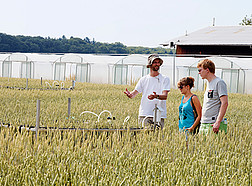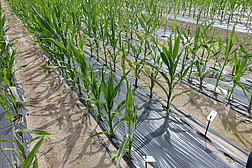Hohenheim mit Meiereihof, Heidfeldhof, Eckartsweier, Kleinhohenheim
This station is made up of the two operations Heidfeldhof (Hohenheim) and Eckartsweier (Upper Rhine Valley). Its spaces are used as an outdoor laboratory for a diverse range of scientific inquiries. Being located in two important climate regions of Baden-Württemberg is the prequisite for basic and applied research and development.
Projects at Heidfeldhof with Eckartsweier
Heidfeldhof (Stuttgart-Hohenheim)

Owing to its physical proximity to the Hohenheim campus, Heidfeldhof is closely integrated into teaching. The station's basic resources in terms of staff and technology are geared to support plot trials involving grains, corn, sunflowers, leguminous plants and forage crops. The operations are designed to provide users with high-quality and homogenous testing areas.
On 86 ha of arable land, about 28 ha are used for plot trials every year. At an altitude of 400m above sea level and with an annual precipitation of 685 mm and an annual mean temperature of 8.5° C, this station allows for growing all crops developed by selective breeding.
Traditionally, the main users of the station have been the Institute of Plant Breeding, Seed Science and Population Genetics and the State Plant Breeding Institute. In addition, the station is used for field experiments by the Institutes of Agricultural Engineering, Apiculture, Plant Nutrition, and Soil Science and Land Evaluation . Ecotoxicologists are operating a FACE research facility here.
Experiments are carried out by users themselves, with support services provided by the Agricultural Experiment Station. The station is also host to many University courses.
Eckartsweier (Upper Rhine Valley)

On 30 ha of arable land, about 13 ha are used for experiments every year. Favorable climactic conditions (726 mm precipitation, 9.9°C annual mean temperature) provide the environment required for intensive research on corn, sunflowers and soybeans.
This station is responsible for the legally required maintenance of corn varieties and components owned by the University. Due to the high risk of infection, Eckartsweier is also an excellence site for research on grain resistance. Owing to the climate, some areas may be used to select for drought stress.
The experiments are performed by users and experiment station staff.

